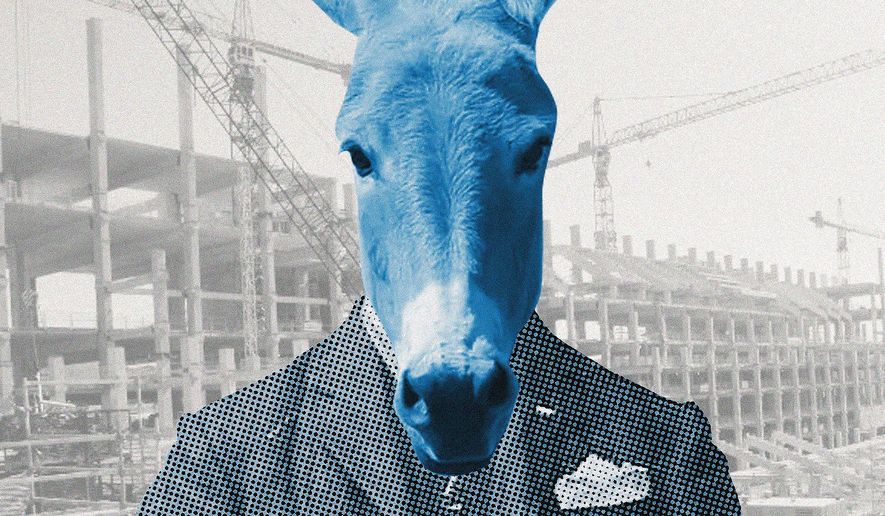OPINION:
My dad spent most of his working life as a union organizer and served for a decade as president of the Rockford, Illinois, Labor Council.
When he died, he bequeathed me a watch and the brass knuckles he carried during the infamous Kohler Strike in the 1950s. My mother was elected to five terms as president of the Women’s Auxiliary of the United Auto Workers. My older brother was a Teamster and a cop; my younger brother an Auto Worker. We moved to Wisconsin when dad couldn’t get a job in staunchly anti-union Rockford. In 1960, I campaigned on street corners for JFK. We were all Democrats back then because people like us believed the party of Roosevelt and Truman represented our interests.
Republicans were rich bankers and business moguls who could be found at the local country club playing golf. They graduated from Ivy League universities and looked down on hyphenated Americans and anybody who worked with their hands. My dad made me promise never to take up golf. It was the way it was. But no longer.
I’ve had a cabin in the West Virginia mountains for 40 years and love the beauty of the state. Our neighbors there may not have graduated from Harvard or Princeton, but they are hardworking, care about each other and are proud of their state and country. They’ve cut the timber in our homes and mined the coal we use to heat them. They’ve fought our wars and suffered from economic downturns, and some have been worn down by the conditions under which they have worked and lived, but they wouldn’t live anywhere else.
Forty years ago, West Virginia was one of the most reliably Democratic states in the country. Democrats controlled both houses of the legislature, both U.S. Senate seats, the governorship and every other statewide constitutional office. A Republican or two had been elected but were regarded as anomalies over the years. The Democratic Party and the Mine Workers Union ruled the Mountain State. But no longer.
Today the lone elected West Virginia Democrat of any stature is Sen. Joe Manchin. A standard-issue West Virginia Democratic governor in an earlier incarnation, Mr. Manchin keeps an ear to the ground in his home state. He has found it more and more difficult to march in lockstep with Senate Majority Leader Chuck Schumer and House Speaker Nancy Pelosi in Washington.
But as a loyal Democrat, he’s usually managed to express his misgivings about their agenda, and then come around to vote with them enough times to heighten their expectations that this time he would hold out for what he could sell to the folks back home as a compromise, then fold and vote for President Biden’s “Build Back Better” scheme. They were shocked, and I was pleasantly surprised, when Mr. Manchin finally signaled that he’d had enough and would vote to defeat the bill. Apparently, the overwhelming majority of his constituents were opposed to Mr. Biden’s bill, which had more influence on him than the pleas of party leaders he knows have nothing but disdain for him and the people he represents.
Last week’s comments about West Virginia’s middle class and working poor from the likes of Hollywood’s Bette Midler and former President Bill Clinton’s quasi-socialist Labor Secretary Robert Reich puts them and the party that values their views squarely in sync with Hillary Clinton’s 2016 description of voters as “deplorables” and former President Barack Obama’s earlier derisive dismissal of voters who “cling to guns or religion or antipathy to people who aren’t like them or anti-immigrant sentiment or anti-trade sentiment as a way to explain their frustrations.” Perhaps Mr. Manchin finally recognizes what many such voters already know: Today’s Democratic Party is no longer the party that attracted the support of millions of hardworking men and women for so long, and thus no longer worthy of their support.
The attacks on the people Mr. Manchin represents by celebrities, his fellow Democrats and their favorite pundits are just another reminder of how much the Democratic Party has changed since the days of Roosevelt, Truman and Kennedy. It has morphed into a party led by and representing the nation’s wealthiest elites. While it may be unlikely, if Mr. Manchin decides to leave the Democratic Party, he can say, as Ronald Reagan did when he made a similar journey decades ago, that he isn’t leaving the Democratic Party, but simply recognizing that it has left him.
My mother and father are gone, but before they died, like millions like them, left the party that had abandoned them, and their sons today all vote Republican.
• David Keene is editor-at-large at The Washington Times.




Please read our comment policy before commenting.